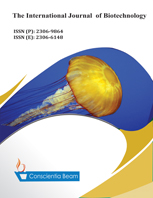Screening of Salt Tolerant Potentiality and Development of in Vitro Tissue Culture System for Some Local Rice (Oryza Sativa.L) Varieties
Abstract
The present investigation was aimed to establishment of an efficient in vitro tissue culture system with high frequency callus and regeneration induction of some local rice (Oryza sativa L.) varieties. Mature Seed Scutellum (MSS) as explants for three rice varieties which were Rajashail, Katicota, and BRRI-22 were taken as an experimental material and cultured on MS based different PGRs and additives supplemented media. In this study, in vitro experiments were conducted for assessing the effects of salt stress on germination rate, length of shoot and root of germinated plant, callus induction, fresh weight of callus and finally regeneration. For germination and callus induction frequency, MSS was cultured on MS-based medium supplemented with different concentrations of NaCl from 0.2% to 1.5%. With increasing the NaCl concentration, both the rate of germination and callus proliferation were decreased. In case of callus induction, callus was formed only for the medium contained 0.2% and 0.5% and 1% NaCl. Gradual reductions in regeneration frequency as well as number of plantlet were observed with increasing the salt concentration in MS-based medium supplemented with 2.5 mgl-1 BAP. All cultivars responded well on medium supplemented with 0.2% and 0.5% NaCl. The best responded regarding the callus induction frequency, the regeneration frequency and the number of shoot per callus were obtained from cv. Rajashail and Katicota among three varieties. A number of regeneration media were also evaluated for regeneration. The optimized medium for plant regeneration was MS + 2.0 mgl-1BAP + 3 mgl-1NAA. These studies revealed that callus induction and plant regeneration frequency were determined by medium combinations as well as genotype of plant. Thus, for developing a new and more potent salt tolerant cell lines, these 2 varieties can be used as suitable sources.

